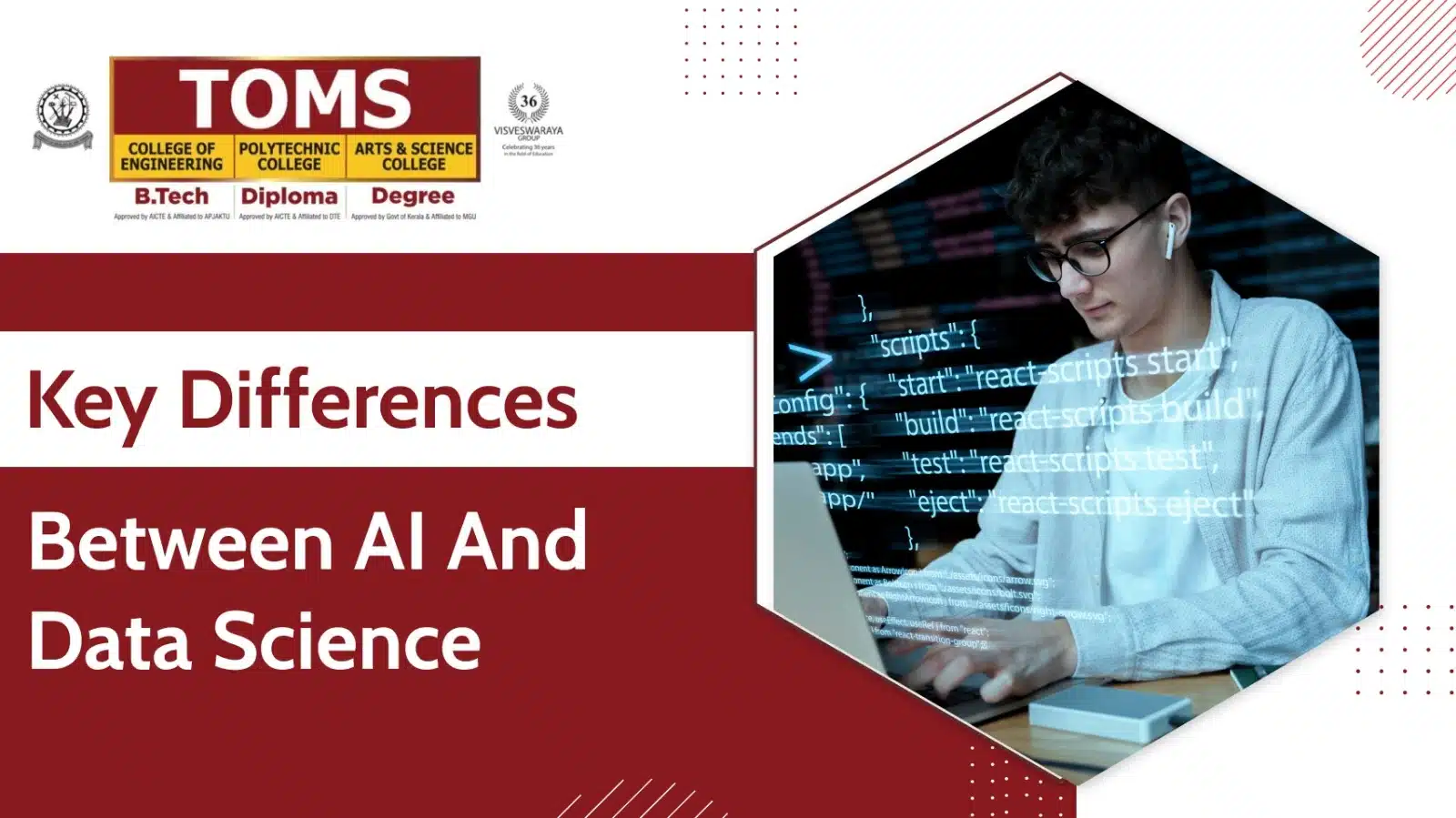
The tech world is run by Artificial Intelligence (AI) and Data Science, but still, there are students who are confused about the same. These two sectors use large amounts of data and algorithms, but they differ in goals, workflows, and job descriptions. Both these courses are the future of the tech world and have become necessary to understand.
In this blog, we are going to discuss the major similarities and differences between AI and Data Science. Alongside discussing why TOMS College of Engineering is one of the best institutions for AI and data science. Let’s start this journey and help you choose your preferred pathway.
Artificial Intelligence (AI) is a field of computer science that forms the basis for systems performing tasks typical of human intelligence. It helps people with learning, reasoning, perception, and languages. The main types of AI are machine learning, deep learning, natural-language processing (NLP), computer vision, and robotics.
The most straightforward mark of AI is to devise systems that are self-reliant to perform tasks without external help. For example, vehicles that drive on their own, or medical imaging systems that detect ailments.
There are multiple courses specializing in AI. If you are looking to do the same, you can get a CS/IT degree and complete ML/AI specialization or a B.Tech in Artificial Intelligence and Data Science.
Data science is a broad and interdisciplinary field focused on the extraction of valuable information from raw data. The major focus areas of Data science are statistics, programming, and domain knowledge. This helps in explaining and predicting the possible situation in business and science.
The domain is about data cleaning, exploratory analysis, modelling, and visualisation. The more highlighted role of machine learning in a data pipeline is to assist the human decision makers, not to replace them. To pursue your future in the same domain, you can either complete a bachelor's degree in Maths/Stats/CS and then MSc, or a certification in data science and analytics.
Both AI and Data Science have their own set of objectives and working. To answer “data science or AI which is better?”, we can go through the table of differences:
|
Focus Area |
Artificial Intelligence |
Data Science |
|
Primary Objective |
Replicate or augment human cognition to automate decision-making. |
Discover patterns, generate insights, and support data-driven decisions. |
|
Typical Output |
Define objective → collect data → choose model → train → deploy real-time system. |
Define question → collect & clean data → exploratory analysis → statistical/ML modelling → visualise & report. |
|
Core Skill Set |
Model optimisation, edge deployment, neural-network architecture, and real-time inference. |
Data wrangling, SQL, statistics, storytelling, feature engineering. |
|
Algorithms Favoured |
Deep neural networks, reinforcement learning, and generative adversarial networks. |
Regression, clustering, decision trees, time-series, and ensemble models. |
|
Toolchain |
TensorFlow, PyTorch, Keras, ONNX, ROS. |
Pandas, NumPy, Scikit-learn, Tableau, Spark. |
|
Career Titles |
AI Engineer, Machine-Learning Engineer, Computer-Vision Scientist. |
Data Scientist, Data Analyst, Business Intelligence Engineer. |
Both AI and data science are two different fields in the tech world. However, both these courses also go hand in hand with their similar foundations and processing languages.
1. Data-Centric Foundation
A large amount of both structured and unstructured data forms the basis for AI and Data Science. The main condition for model training, insight generation, and predictive accuracy in both areas is the right, clean, and valuable data.
2. Common Language: PythonPython, being both easy to use and having a wealth of resources, stands as the leading language in both domains. AI and Data Science applications can make use of such shared libraries as Pandas, NumPy, Scikit-learn, and TensorFlow.
3. Machine Learning OverlapMachine learning is a connecting thread between AI and Data Science. For instance, algorithms such as regression, clustering, and decision trees are common to both fields since they are used to extract patterns and develop predictive or self-learning models from the data.
4. Cloud & GPU UsageAI and Data Science are two fields that work on high computational power that is to be trained and processed, which is through cloud platforms like AWS, Azure, or Google Cloud, as well as GPU acceleration for faster performance.
5. Ethical & Regulatory FocusData privacy, fairness, and algorithmic bias are crucial problems of both domains. The professionals are obliged to comply with the ethical principles and the regulatory norms while they are constructing the right and clear models.
At TOMS College of Engineering, you can get hold of a four-year, AICTE‑approved engineering programme. B.Tech in Artificial Intelligence and Data Science offers practical skills, cutting‑edge tools, and real‑world exposure to thrive in AI‑powered industries.
1. Comprehensive 4‑Year Curriculum
The difference between data science and artificial intelligence is quite evident. Data Science is the process of converting numbers into business knowledge, while AI is transforming such knowledge into self-action. If you like analyzing trends and making decisions, then data science is for you.
You will find AI irresistible if you are interested in computers that can learn on their own. Programs such as B.Tech in artificial intelligence and data science at TOMS College blend both fields, equipping students with strong skills and versatility. With high salaries and continuous interaction regardless of the difference between AI and data science, both fields are meant to grow.
Which is better, AI or data science?
It depends on your interests; AI is for autonomous solutions, and Data Science for analytical insight.
Can AI replace data science?
Not at all. AI has to be equipped with statistical principles for good-quality inputs and understanding.
Who earns more, an AI or a data scientist?
The entry-level salaries of AI engineers are higher on average, but the senior data scientists at times can also match or go beyond them.
What skills are required for AI engineers?
Proficient in Python, deep-learning frameworks, math concepts, handling data, and deployment.



